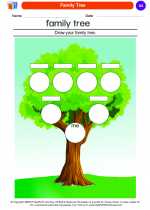Siblings
Siblings are brothers and sisters who share the same parents. Having siblings can be a unique and special relationship that lasts a lifetime. It is important for children to understand the concept of siblings and the role they play in family dynamics.
What are Siblings?
Siblings are people who share at least one parent in common. They can be biological siblings, adopted siblings, half-siblings, or step-siblings. Siblings can have different relationships, but they are an integral part of a family unit.
Roles of Siblings
Siblings can play various roles in each other's lives. They can be friends, mentors, rivals, and supporters. They often learn important social skills through their interactions with each other, such as sharing, communication, and conflict resolution.
Benefits of Having Siblings
- Companionship
- Support system
- Learning to share and cooperate
- Building social skills
- Having someone to confide in
Activities to Explore the Concept of Siblings
1. Family Tree: Have children create a family tree that includes their siblings, illustrating the relationship between them and their brothers and sisters.
2. Drawing or Writing Activity: Ask children to draw a picture of their siblings or write a short story about a fun experience they had with their sibling(s).
3. Role-Playing: Encourage children to act out different scenarios with their siblings, emphasizing the importance of communication and empathy.
Discussion Questions
1. What does the word "siblings" mean?
2. How do you feel when you spend time with your siblings?
3. What are some things you like to do with your siblings?
4. Why is it important to get along with your siblings?
5. How can siblings help and support each other?
Understanding the concept of siblings and their roles in a family can help children appreciate the bonds they share with their brothers and sisters, and develop important social skills that will benefit them throughout their lives.
.
